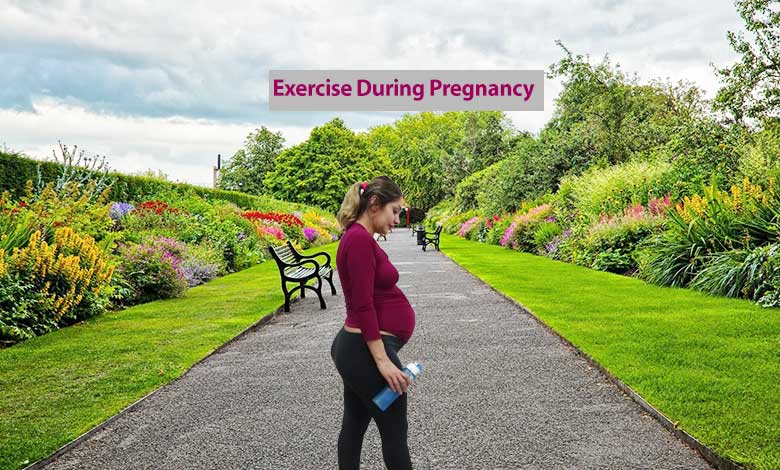Exercise During Pregnancy

Because of the health of the fetus, it is often thought that exercise during pregnancy is dangerous for the mother and the child, and the mother should minimize exercise during pregnancy and not be so active; This is not a correct belief and the mother can do safe sports during pregnancy with a proper program and under the supervision of an expert.
Maintaining an exercise program during pregnancy can help you stay healthy and feel well. Exercise during pregnancy is effective in improving the condition and relieving some common discomforts such as back pain and fatigue. There is evidence that physical activity can help prevent gestational diabetes (diabetes that develops during pregnancy), relieve stress, and facilitate labor.
In the rest of this article, we will explain the necessary amount of exercise during pregnancy and the obstacles to prohibiting exercise during pregnancy, and then we will introduce safe exercises during pregnancy.
Exercise in pregnancy
If you were physically active before pregnancy, it is better to continue your activity in moderation and plan for exercise during your pregnancy. You don’t have to exercise as hard as you used to, instead, do what’s most comfortable for you now and incorporate it into your exercise routine. Aerobics with low impact is recommended over the high impact and is one of the safest sports during pregnancy.
A pregnant athlete who participates in competitions must be under the supervision of a gynecologist and obstetrician and have a suitable program for exercise during pregnancy.
If you’ve never exercised regularly before, you can safely begin an exercise program during pregnancy after consulting with your healthcare provider. But new and heavy activity is not suitable. Walking during pregnancy is recommended and is a safe exercise during pregnancy.
It’s best to get 30 minutes or more of moderate exercise most days of the week unless you have medical or pregnancy complications.
Related posts: Chromium In Your Pregnancy Diet
Who is not suitable for exercise during pregnancy?
Exercise during pregnancy is not recommended if you have a medical condition such as asthma, heart disease, or diabetes. Exercising during pregnancy can be harmful if you have a pregnancy-related illness, such as:
- Bleeding or spotting
- Bottom pair
- Abortion
- History of premature birth
- Cervical weakness
Before starting an exercise program during pregnancy, talk to your midwife. Based on medical records, he can provide you with personalized instructions for exercise during pregnancy.
What are the safe exercises during pregnancy?
Most types of exercise are safe during pregnancy, as long as you are careful and don’t overdo it.
Safe exercise during pregnancy includes swimming, brisk walking, stationary indoor cycling, stair climbers, and low-impact aerobics (taught by a licensed aerobics instructor). These cases of activity in pregnancy are of low risk and can continue until birth.
Tennis and racquetball are generally safe activities, but changes in balance during pregnancy may affect quick movements. Other activities such as jogging can be done in moderation, especially if you did them before pregnancy. It’s best to choose exercises or activities that don’t require a lot of balance or coordination, especially late in pregnancy.
What sports should be avoided?
Some activities during pregnancy can be harmful. Contains:
- Types of exercise during pregnancy that require breath holding.
- Exercises with the possibility of falling (such as skiing and riding).
- Contact sports such as softball, soccer, basketball, and volleyball.
- Any exercise that results in even mild abdominal impact, such as activities that involve jerky movements or rapid changes of direction.
- Activities that require a lot of jumping, skipping, running, or running.
- Exercises with deep knee bending, full sitting, standing on both legs and touching the toes directly.
- Jump while stretching.
- Waist movements while standing.
- Heavy bouts of exercise followed by long periods of inactivity.
- Exercise in hot and humid weather.
What should the pregnancy exercise program consist of?
Gaining some weight during pregnancy is normal. (To find out how much weight gain is normal during pregnancy, read this post.) To be in perfect shape, a pregnancy workout program should help build muscle and tone.
Always start exercising during pregnancy by stretching, stretching, and warming up for five minutes. Include at least fifteen minutes of cardiovascular exercise in your pregnancy exercise plan. Measure your heart rate during peak activity. Follow aerobic activity with five to ten minutes of slow, gradual exercise that ends with gentle stretching.
Here are some basic guidelines for exercise during pregnancy:
- Wearing comfortable and loose clothes as well as a suitable bra.
- Choosing the right shoes for the type of exercise. Proper footwear is the best protection against injury.
- Exercising on a smooth surface to avoid injury.
- Consuming enough calories to meet the needs of pregnancy (300 calories more than before pregnancy per day) as well as sports programs.
- Refrain from eating at least one hour before exercise.
- Drinking water before, during, and after exercise.
- Getting up gradually after doing Kegel exercises to prevent dizziness.
- Never exercise to the point of exhaustion. If you can’t talk normally while exercising, you’re probably overdoing it and need to cut back.
What changes in pregnancy can affect exercise?
Physical changes during pregnancy add to the needs of the body. With the changes below, remember to listen to your body and adjust your pregnancy activity if necessary.
A growing baby and other internal changes require more oxygen and energy.
Hormones produced during pregnancy stretch the ligaments that support the joints and increase the risk of injury.
Excess weight and uneven weight distribution change the body’s center of gravity. Excess weight causes pressure on the joints and muscles of the back and pelvis and loss of balance.
Important warnings about exercise during pregnancy
Avoid exercising during pregnancy and consult your doctor in the following situations:
- Chest pain
- Abdominal pain, pelvic pain, or constant cramping
- Headache
- Absence or reduction of fetal movements
- Feeling weak, confused, nauseated, or lightheaded
- Feeling cold
- Vaginal bleeding
- One-time leakage or drops of liquid from the vagina
- Irregular or rapid heartbeat
- Sudden swelling of the ankles, hands, face, or legs
- Shortness of breath
- Difficulty walking
- Muscle weakness
The right time to exercise after childbirth
You can ask your doctor about the right time to start sports activities after delivery.
Although you want to resume your activities as soon as possible, it is better to do this gradually. Follow your healthcare provider’s exercise recommendations in this regard.
Most women can begin light activity one to two weeks after a vaginal delivery (or three to four weeks after a C-section). Do about half of your normal Kegel exercises and don’t overdo it.
Which exercises should be avoided during pregnancy?
What kinds of exercises are safe during pregnancy?
Is it OK to exercise every day while pregnant?
When should I start exercising during pregnancy?
final word
Exercising during pregnancy is generally not dangerous if you do not exert too much pressure, or do not overdo it during pregnancy. Have a complete list of safe exercises in pregnancy and try to do them often. If you are not sure about the right exercise program during your pregnancy, it is better to have the best exercise program during pregnancy with the help of a doctor of obstetrics, gynecology, and infertility.
